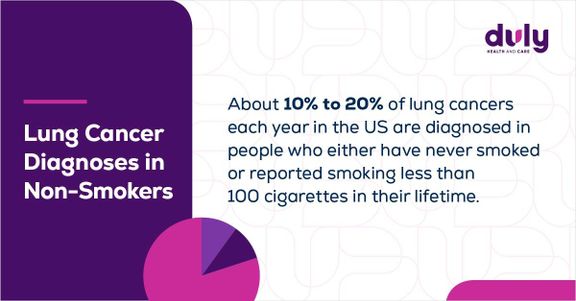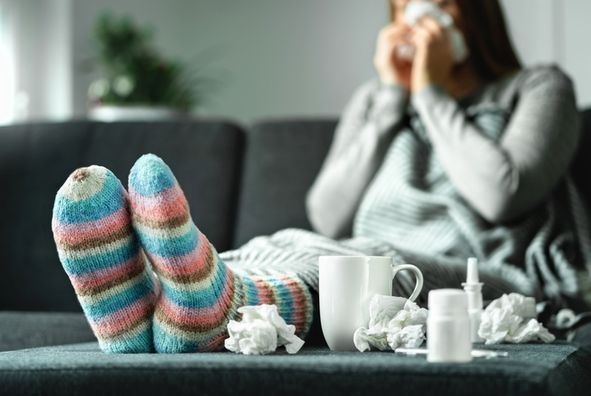If you’ve never smoked a day in your life, or even been around smokers, you might think you’re safe from getting lung cancer. Unfortunately, you don’t have to smoke to get lung cancer. If you’re a nonsmoker who has been diagnosed with lung cancer, you might feel confused, surprised, or even scared.

There are several things other than smoking that can cause lung cancer — from secondhand smoke to genetics. If you’re experiencing frequent coughs, coughing up blood, or feeling chest pain, you’ll want to see a Duly pulmonologist immediately. They’ll be able to diagnose and treat you.
What Causes Lung Cancer?
Lung cancer’s main risk factor is smoking cigarettes. Smoking tobacco products like pipes or cigars can increase your risk because of the toxic mix of chemicals in tobacco, but there are also some lesser-known causes of lung cancer that have nothing to do with smoking.
Here are other reasons you might get lung cancer.
Radon Exposure
Radon is a natural radioactive gas that can be dangerous over time when inhaled indoors. In the US, 21,000 people die each year from radon-related lung cancer. Because it’s odorless, most people won’t know it’s a problem unless they test the location for it. Radon gas is harmless outdoors because it disperses. It becomes a health concern when it gets trapped indoors. The gas can creep into buildings through cracks or holes in the foundation of your home.
To keep your home, school, or workplace safe, you can have it tested for radon levels. There are do-it-yourself tests or you can call a professional.
Do you think you’ve been exposed to something that can cause lung cancer or you’re showing symptoms? You can schedule an appointment with a Duly pulmonologist to discuss your concerns.
Asbestos Exposure
Asbestos is a mineral that naturally forms in rocks and dirt. It’s common to find asbestos in building construction materials for insulation, ceiling and floor tiles, heat-resistant fabrics, and more. Asbestos usually doesn’t pose any harm unless its fibers have been disturbed. That can happen through building or home maintenance, repairs, demolition work, and remodeling.
If you suspect you have something that contains asbestos, don’t touch it. Contact an asbestos professional to determine how to handle and dispose of it — and contact your healthcare provider to determine if you have been exposed to it.
Diesel Exhaust Exposure
Diesel exhaust is a combination of gasses and particulates that are created when making diesel fuel. People who work around diesel exhaust might face several health risks, including lung cancer. Wearing respiratory equipment and limiting the amount of exposure are some precautions that can be taken. If you’re worried about potential exposure, speak with your provider who can test you for lung cancer.
Arsenic Exposure
Arsenic is another lesser-known cause of lung cancer. It’s a natural element or metal, that can form in the air, plants, rocks, and soil. Some forms of arsenic can be found in drinking water, foods like rice, fish, and shellfish, as well as in industrial areas like glass factories.
Research has shown that lung cancer has been connected to arsenic exposure. If you think you’ve been exposed, talk to your provider immediately.
Secondhand Smoke
If you’re around someone who smokes and you inhale the smoke, that’s nearly the same as if you smoked the cigarette yourself. Secondhand smoke can also cause lung cancer. People who are regularly exposed to secondhand smoke at work or at home have a 20 to 30% increased risk of developing lung cancer. But even brief exposure to secondhand smoke can be harmful.
If you’ve been exposed to secondhand smoke and are experiencing any symptoms like frequent coughing or chest pains, let your provider know.
How Can You Lower Your Risk of Lung Cancer?
Although not all lung cancers can be completely avoided, you can lower your risks by not smoking, not being in close contact with smokers, and avoiding other cancer-causing substances, found in the environment, like radon and arsenic.
Learn who needs to be screened for lung cancer and see if you meet the requirements.
Taking Care of You
If you do find out you have lung cancer, you may be feeling many emotions. It’s not uncommon to feel as if your world has been turned upside down.
Compared to other cancers like breast or prostate cancer, lung cancer has a higher death rate in the US, but when it’s caught early, it has a much better chance of being cured. Survival rates increase to nearly 60% compared to 6% when found at an advanced stage.
You’re also not alone. Our pulmonologists and oncologists will work with you every step of the way.
Health Topics:








